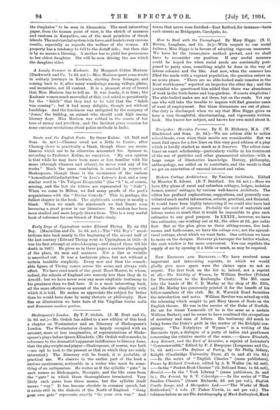Dante and the English Poets. By Oscar Kuhns. (G. Bell
and Sons. 6s. net.)—Chaucer owed not a little to Dante ; after Chaucei there is practically a blank, though there are resem- blances which are to be otherwise accounted for. Spenser is, according to Professor Kuhns, no exception. "My own opinion is that while he may have been more or less familiar with his name (through Chaucer and others), he never read any of his works." Much the same conclusion is reached in respect or Shakespeare, though there is the occurrence of the curious " honorificabilitudinitatibus " in Love's Labour's Lost, and a very similar word in "De tulgari Eloquentia," (the " h " is, of course, missing, and the last six letters are represented by " itale "). When we come to Milton, we find many proofs of the poet's acquaintance with the "Divine Comedy." This is, perhaps, the fullest chapter in the book. The eighteenth century is mostly a blank. When we reach the nineteenth we find Dante soon becoming a great power in our literature. No modern has been more studied and more largely drawn from. This is a very useful book of reference for one branch of Dante study.


































 Previous page
Previous page